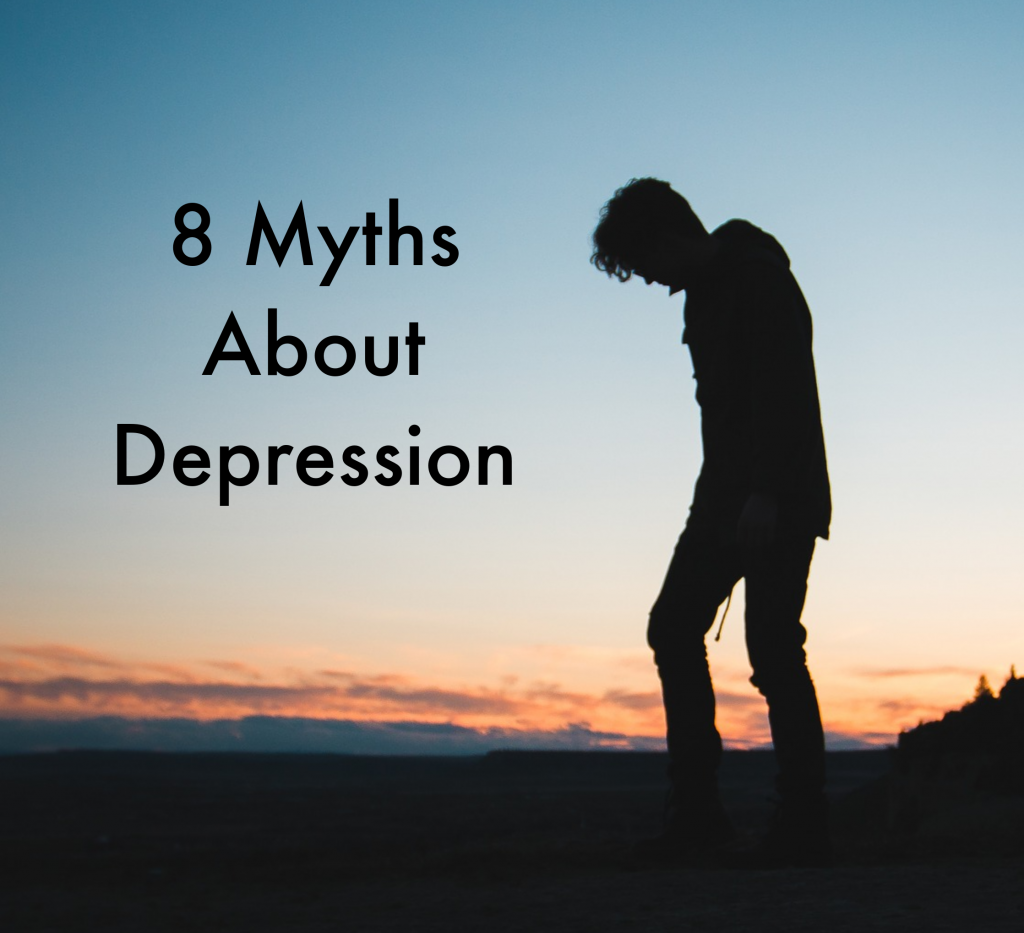
Depression is one of the most common mental disorders in the United States. According to the Anxiety and Depression Association of America, Major Depressive Disorder affects over 16 million people per year and is the number one cause of disability in ages 15-44. Yet there is still much stigma and misinformation out there about the disorder. Because of this many people who need help don’t get it out of fear of being ostracized or simply not knowing the facts about depression.
Before going into the myths, let’s quickly talk about what depression is. Depression is a mental illness that affects the way a person functions both mentally and physically. Symptoms must last at least two weeks in order to get a diagnosis of depression, but episodes can last much longer. Basic symptoms are:
-
- Loss of interest in activities you once enjoyed
- Sleeping too much or not being able to sleep
- Changes in diet – eating too much or not enough
- Fatigue – low levels of motivation
- Feeling of worthlessness or guilt
- Inability to concentrate
- Thoughts of suicide
Now that we have an idea of what depression looks like, let’s look at some of the misconceptions associated with it. Here are several of the myths surrounding depression:
-
- Depression isn’t a real illness – While it is true that there is no physical exam or bloodwork that can be used to give a diagnosis, that doesn’t mean it isn’t real. Depression is much more complex than just sadness. Scientists have recently suggested that it is more than even a chemical or neurotransmitter imbalance in the brain encompassing biological, psychological and social components. Most people only see the emotional side of depression and don’t realize that it can affect the physical body as well. It is an illness that takes time to treat and manage. It literally isn’t “all in your head.”
- There is always a trigger – True a tragic event may start us in a downward spiral, but it doesn’t always work that way. A depressive episode can seemingly come out of the blue. Again – depression is not just sadness in response to a certain event. It’s more complicated than that. There are situations that make us more prone to get depressed – like stress, sickness, drug and alcohol use – but it’s not always the case.
- Antidepressants will change you – If we are taking the right dosage of medication, we will feel more like ourselves than we do without them. They do not change our personality or change us into somebody we aren’t. Their main purpose is to balance out chemicals in the brain to help deal with the symptoms of depression.
- Antidepressants are the only way to treat depression – While medication is a powerful tool in fighting depression, it isn’t the only one. Psychotherapy or talk therapy is strongly suggested in dealing with depression. We can learn coping skills that help. There are also forms of brain stimulation therapies available.
- Depression is a normal part of life – Sadness and disappointment are a normal part of life – not depression. Once again depression is much more complex than simply feeling blue. It is a prolonged period of hopelessness, lethargy, and fogginess among other symptoms. Some people believe that depression is part of growing older. It isn’t. Sure, depression can happen at any time, but aging is generally not a reason for it.
- Only women get depressed – Four times as many men die by suicide than women. It isn’t that men don’t get depressed, it’s that they aren’t as willing to talk about it as much as women. Men are less likely to seek treatment as they perceive it as a sign of weakness. In fact, some studies suggest that depression is just as prevalent in men as in women.
- Everyone’s depression is the same – While there is a general list of depression symptoms, the severity of the symptoms varies from person to person. Also, men can experience different symptoms than women. Women tend toward feeling guilty and weepy while men can become angry and irritable.
- Depression is something you can just “snap out of” – This one is my favorite! Oh, if it were only that simple! Depression cannot be cured with positive thinking, a great diet and plenty of exercise. True, those things are great tools in dealing with depression, but they don’t make it go away any more that pulling out an umbrella will make it stop raining. No one chooses to be depressed and we can’t will our way out of it. If that were true, there wouldn’t be near as many people who suffer from it. It isn’t a sign of weakness or self-pity. Once again, depression is far more complicated than that.
Depression is a real condition that many, many people suffer from, but treatment is available and works along with self-care and coping mechanisms. If you or someone you love deal with depression, please seek help! I personally went years without getting help and now that I’m on medication and seeing a therapist, I wish I had done it much sooner! Don’t let the myths or misconceptions keep you from getting the help you deserve.
